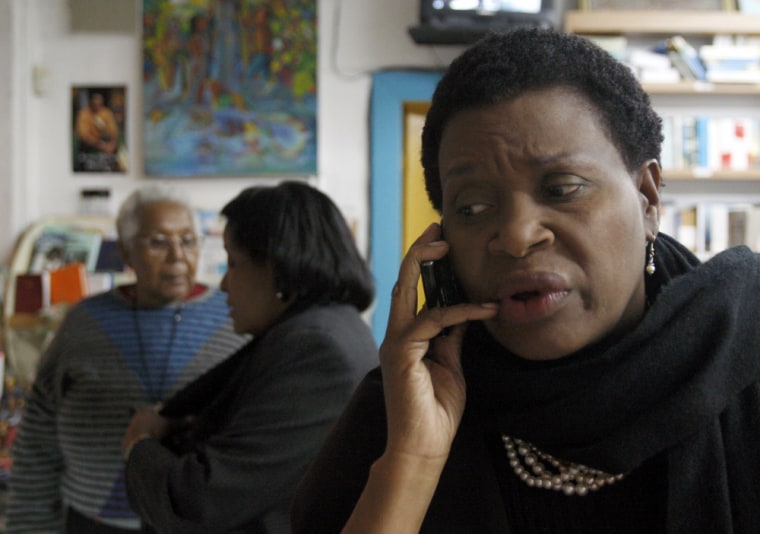Dozens gathered at the Veye-Yo community center in Little Haiti embraced, trying to comfort each other as they desperately tried to reach relatives in earthquake-ravaged Haiti.
A pastor led them in prayer Tuesday and they took turns discussing what they could do to bring aid to the impoverished island nation that cannot seem to escape turmoil caused by natural disasters and political upheaval.
Tony Jeanthenor, 50, said a friend he reached in Haiti described hearing people cry out for help from under debris.
"The level of anxiety is high," he said. "Haiti has been through trauma since 2004, from coup d'etat to hurricanes, now earthquakes."
Haitian-Americans in Miami, New York and other U.S. cities tell a similar story of frantically trying to get through to relatives and friends to see if they survived the largest earthquake to hit the Caribbean nation in 200 years. Communications were widely disrupted, making it impossible to get a full picture of damage and casualties as powerful aftershocks shook the desperately poor country where many buildings are flimsy.
"Everyone is in shock right now. No one can get through," said the Rev. Robes Charles, pastor of St. Clement Church in Wilton Manors. About 275,00 Haitians live in the South Florida metro area.
Wife, young daughter near epicenter
Danglass Gregoire headed to Florida for a business trip Tuesday, leaving his wife and young daughter behind in Haiti, close to the epicenter of the 7.0 earthquake. When he arrived at Miami International Airport, the 41-year-old said he wasn't sure if they were alive.
"I call. I call. I call. No one answers," he said.
West Palm Beach firefighter Nate Lasseur tried to reach family and the firefighters he trains in the capital of Port-au-Prince, which has largely been destroyed.
He was doing training through his International Firefighters Assistance in November 2008 when a school collapsed, killing nearly a hundred people. He described chaos then — firefighters pushing through panicked crowds, digging through the debris.
"They are not prepared as far as equipment and training goes for something of this magnitude," Lasseur said. "Their adrenaline and pure will to save their families — that only lasts for so long."
Others sought ways to get aid to the country.
In the Chicago suburb of Evanston, about 25 members of the Haitian Congress to Fortify Haiti gathered to pray and make plans to help.
"It's a little somber, we're trying to figure out what to do. We're trying to get facts, come together, hold each other up and go beyond our own limitations and try to build collective support," Lionel Jean-Baptiste, chairman of the organization and alderman of Evanston's second ward, told the Chicago Tribune.
The Archdiocese of Miami is accepting donations for earthquake victims. Other South Florida Haitian relief groups have not announced their efforts but planned to meet Wednesday.
Not only are major organizations planning aid. King Moshe, 43, who works at Chef Creole in the Little Haiti area of Miami, said he will speak with local groups about collecting food, clothing and money.
"Right now is a time to come together to help the unfortunate ones," Moshe said.
'Helplessness'
Edwidge Danticat, a Haitian-American author whose books about the country have won the National Book Award and the Pushcart Prize, gathered family and friends at her Miami home, which has become something of a command center.
"Some people are online, some are watching CNN, some are listening to Haitian radio," she said late Tuesday night. "There's a huge sense of helplessness about it. You want to go there, but you just have to wait. I think the hardest part is the lack of information."
She said that for years, Haitians wondered with trepidation what would happen if an earthquake hit.
"Life is already so fragile in Haiti, and to have this on such a massive scale, it's unimaginable how the country will be able to recover from this."
